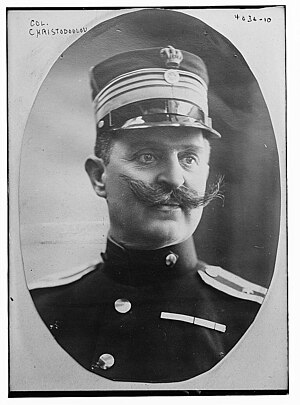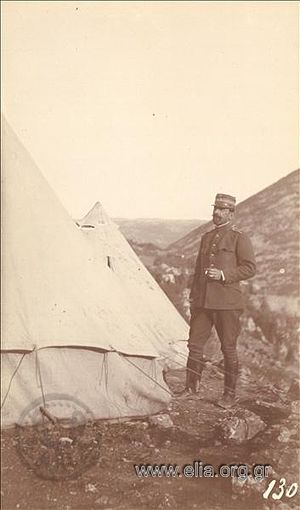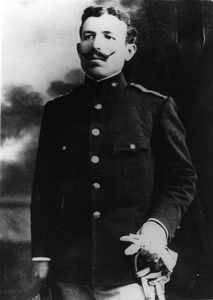Discover Your Roots
SIGN UPDiscover Your Roots
SIGN UPNikolaos is a male name of Greek origin, meaning "Victory Of The People." It derives from the Greek elements "nikē" for "victory" and "laos" for "people," representing a "people's champion" or "conqueror of people." The English form of this name is Nicholas. In the sports realm, individuals bearing the name Nikolaos have excelled in various fields, including athletics, soccer, and diving. Notable figures with the name Nikolaos include Prince Nikolaos of Greece and Denmark, Saint Nicholas, and Nikolaos Zachariadis, the General Secretary of the Communist Party of Greece. In fiction, Nikolaos is known as the Master Vampire of the City of St. Louis in Laurell K. Hamilton's novel "Guilty Pleasures." The name Nikolaos is also associated with the diminutive form "Nikos" and has varied international counterparts, such as "Niccolò" and "Nicholas."

Nikolaos "Nikos" Michopoulos, born on February 20, 1970, is a former Greek professional football player renowned for his exceptional goalkeeping skills. He began his career at Apollon Larissa and later joined PAOK Thessaloniki, where he made over 187 appearances and earned 15 international caps for Greece. Michopoulos also played for Burnley, Crystal Palace, and Omonia Nicosia, making almost 100 appearances for Burnley. Known as "Nik the Greek," he became a fan favorite and a cult-hero at Turf Moor. After retiring from playing, Michopoulos returned to PAOK as the goalkeeping coach, a position he still holds. His contribution to the sport and his dedication to PAOK have solidified his status as a respected figure in Greek football. Michopoulos's remarkable career and continued involvement in the sport have left a lasting impression on football enthusiasts worldwide.Keywords: Nikolaos Michopoulos, Greek football player, PAOK Thessaloniki, Burnley, goalkeeping coach, international caps, Apollon Larissa, cult-hero, Turf Moor

Nikolaos Christodoulou (Greek: Νικόλαος Χριστοδούλου; 1863 – c. 1924) was a distinguished Greek infantry officer who achieved the rank of Major General. Born on 18 July 1863 in Chalcis, he began his military career by enlisting in the Hellenic Army on 14 July 1878. Throughout his service, Christodoulou demonstrated exceptional leadership and bravery, notably during the Unfortunate War and the Balkan Wars of 1912–13.During the Balkan Wars, he served as a battalion commander in the 3rd Infantry Regiment and later assumed command of the 1st Infantry Regiment following the tragic death of its commander, Col. F. Dialetis. His unwavering dedication and strategic prowess led him to assume command of the entire 3rd Regiment and later the Serres Division, which he led to the front near Gevgeli in December 1916. Despite facing the Bulgarian invasion of eastern Macedonia, Christodoulou steadfastly led his division until 1918 when he was replaced due to illness. He retired on 24 April 1924, leaving behind a remarkable legacy of honorable service and courageous leadership.Christodoulou's commitment to his country and his exceptional military career have left an indelible mark on Greek history and the Hellenic Army.References: [

Nikolaos Vlachopoulos (Greek: Νικόλαος Βλαχόπουλος; 1868–1957) was a distinguished Hellenic Army officer who achieved the rank of Lieutenant General. Born in Chalkis in 1868, he graduated from the Hellenic Military Academy and continued his studies in Germany and Belgium. Throughout his career, Vlachopoulos participated in various Greek wars and served as Chief of the Hellenic Army General Staff twice, from 1922–1924 and 1927–1928. Notably, during the Balkan Wars of 1912–13, he commanded a field artillery battalion and played a significant role in the Epirus front during the First Balkan War. Vlachopoulos was a well-educated officer, fluent in several languages including German, French, Italian, and English. He was also a prolific writer, having authored an artillery manual for the Military Academy and translated a book on the Greco-Turkish War of 1897. Vlachopoulos passed away in 1957, leaving behind a legacy of military leadership and intellectual contribution.

Nikolaos Polias, born on 28 March 1971, is a renowned Greek long-distance runner known for his impressive athletic prowess. He made his mark on the global stage by competing in the men's marathon at the 2004 Summer Olympics, showcasing his exceptional talent and dedication to the sport. With a remarkable career and representing his country at such a prestigious event, Polias has earned widespread recognition and admiration for his contributions to the world of long-distance running. His participation in the Olympics solidified his status as a notable figure in the athletic community, inspiring many with his remarkable achievements. Nikolaos Polias continues to inspire aspiring athletes and remains an influential personality in the realm of long-distance running.

Nikolaos Tsipouras, also known as Nικόλαος Τσίπουρας, was a distinguished Hellenic Army officer who played a significant role in various military campaigns. Born on 1 June 1880 in Platanos, Nafpaktia, Tsipouras began his military career in 1901 and demonstrated exceptional leadership during the Macedonian Struggle and the Balkan Wars. He courageously led his own troop in the Florina–Monastir and Veroia–Naoussa–Vodena areas, and later fought in the Epirus front. Tsipouras's valor in the Battle of Skra-di-Legen during World War I earned him a field promotion to lieutenant colonel. His contributions continued in the Asia Minor Campaign, where he served as deputy commander and later commander of the 53rd Infantry Regiment. Tsipouras retired as a Major General in 1929, having left an indelible mark on the military history of Greece. Beyond his military achievements, he also served as the Minister Governor-General of Macedonia from 1936 to 1937 in the cabinet of Ioannis Metaxas. Nikolaos Tsipouras's legacy as a brave and dedicated military leader endures as a testament to his unwavering commitment to his country.
All images displayed on this page are sourced from Wikipedia or Wikimedia Commons.We use these images under their respective Creative Commons or public domain licenses. Wherever applicable, author attributions and license information are provided. If you believe an image is used incorrectly or outside its license terms, please contact us so that we can review and correct the issue.